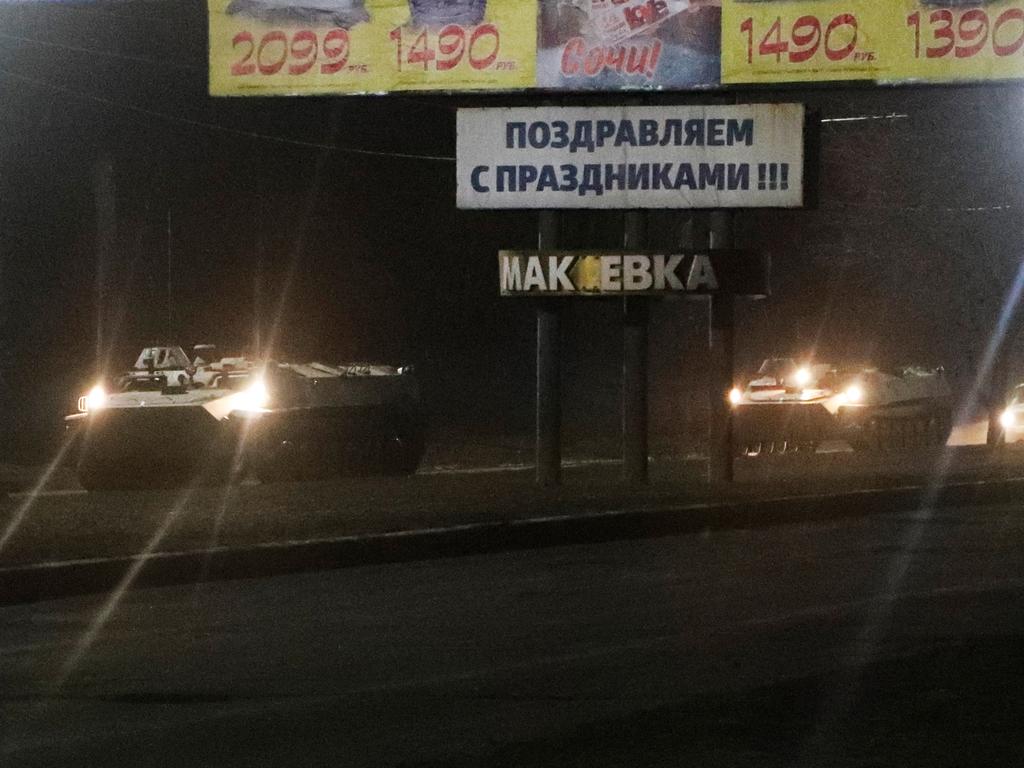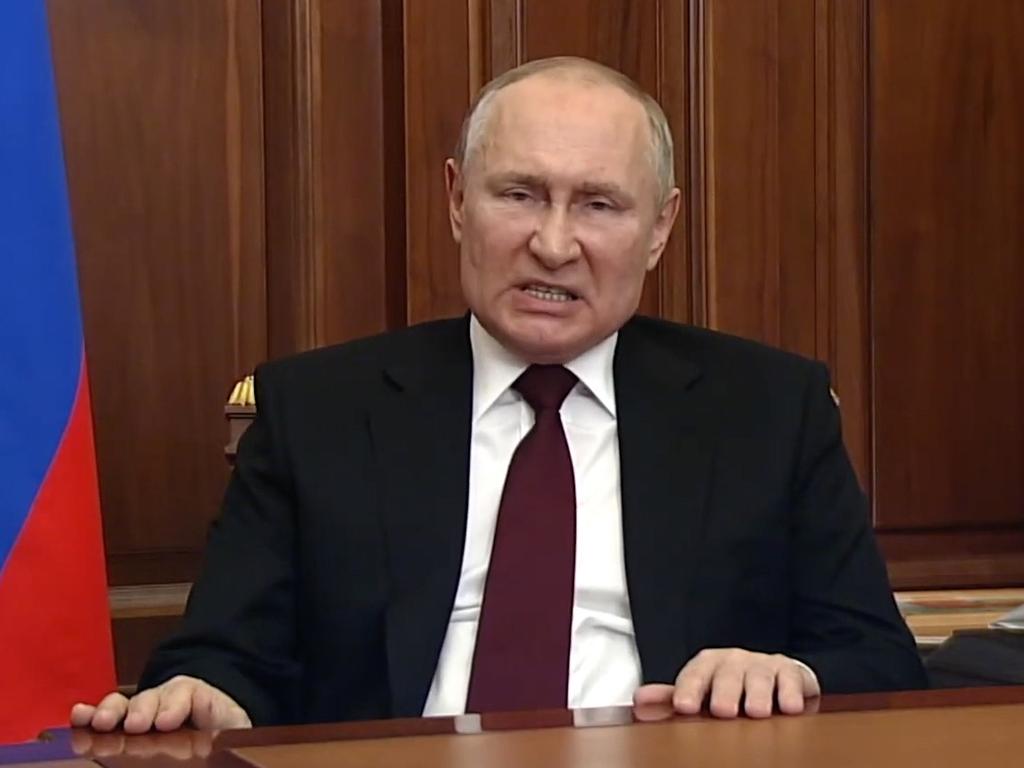Vladimir Putin labels Ukraine a nuclear threat, says he’s prepared to use force
NATO warns of most dangerous moment in European security in a generation as Vladimir Putin says he will use military force.
Russian president Vladimir Putin has announced he would use military force “depending on the situation on the ground” to defend the rights of people in the separatist regions Donetsk and Luhansk.
After receiving approval from the Russian parliament to deploy troops abroad into Ukraine, Mr Putin labelled Ukraine a nuclear threat, telling the Russian people it wanted to lose its neutrality, join NATO and that it received military shipments from the West. Mr Putin also claimed that citizens in the Donbas region were being “abused”.
Crucially, Mr Putin recognised the independence of the entire Donetsk and Luhansk oblasts and its broader territorial ambitions, not just the area controlled by Russian backed separatists.
About two-thirds of this area, known broadly as the Donbas, is currently in Ukrainian control.
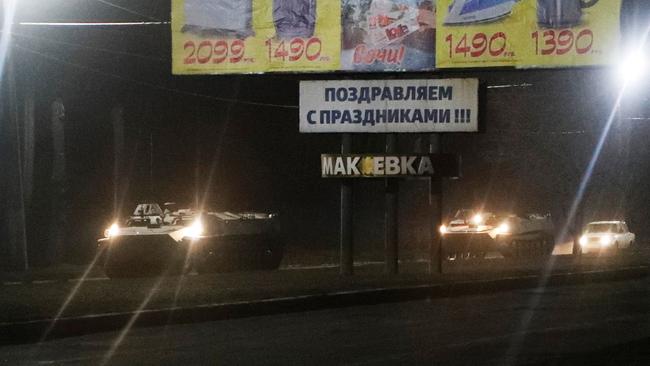
Mr Putin said Ukraine was being “armed to the teeth” and that its nuclear threat was a strategic issue. He said Ukraine president Volodymyr Zelensky’s remark that he regretted Ukraine giving up nuclear weapons in 1994 was targeted directly at Russia.
“We have taken a note of them,” Mr Putin said.
NATO secretary-general Jens Stoltenberg warned on Tuesday afternoon: “This is the most dangerous moment in European security in a generation.”
He said Russia continued to plan for a full-scale attack on Ukraine and that additional Russian forces had begun moving into the Donbas in numbers far exceeding those seen in Russia’s years-long support of separatists in the region.
“We see more and more military move out of camps and into combat formations, we see ongoing provocations in Donbas,’’ Mr Stoltenberg said at a NATO press conference in Brussels.
“It makes the situation even more serious, it’s a step change.’’
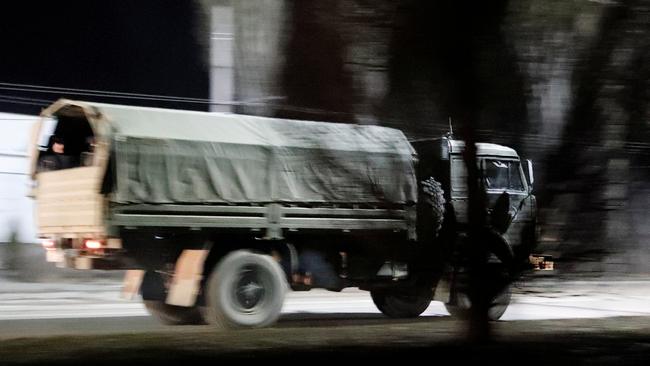
Britain has begun an economic isolation of Russia for recognising the independence of the Luhansk and Donetsk areas of Ukraine, initially targeting five Russian banks and three billionaire oligarchs closely linked to president Vladimir Putin.
As Russian tanks rolled into the industrial Donbas region of Luhansk and Donetsk – where Russian-backed separatists downed MH17 with a BUK missile in 2014 – various governments across Europe, Britain and the United States condemned “the invasion”.
Mr Putin said that Russia recognised the territory was now independent and warned the border region had been a threat to the Russian Federation.
Jon Finer, US principal deputy national security adviser, said at the White House overnight (AEDT): “We think this is, yes, the beginning of an invasion, Russia’s latest invasion into Ukraine.”
In a dramatic development, German chancellor Olaf Scholz paused the $US10bn Nord Stream 2 gas pipeline, spiking the price of gas and oil across the continent. The new and controversial 1200km pipeline had been intended to help Germany and other parts of Europe transition away from nuclear and coal-fired power. Germany currently imports about 55 per cent of its gas from Russia. But Dmitry Medvedev, vice president of Russia’s council of security, warned of surging energy prices as a consequence of Scholz’s move.
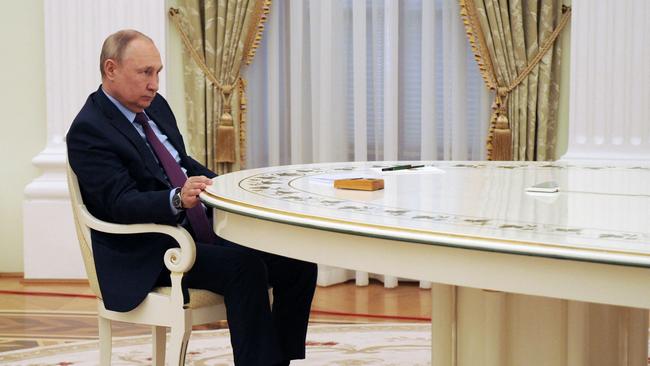
Medvedev tweeted: “Well, welcome to the new world where Europeans will soon pay 2,000 euros for 1,000cm3 of gas.”
UK prime minister Boris Johnson said the latest moves by Russian forces into the separatist areas of Ukraine were a renewed invasion and a pretext for a full scale offensive.
“Putin is implacably determined to go further in subjugating and tormenting Ukraine,’’ Mr Johnson told Westminster.
“Putin’s venture in Ukrainian must fail. We are in a position to impose very considerable economic costs on Putin. The question is whether he is going to care enough about it because he is clearly in an illogical and irrational frame of mind.”
British foreign minister Liz Truss said the UK would “use our economic heft to inflict pain on Russia and degrade their strategic interests”.
“And we are prepared to go much further if Russia does not pull back from the brink,” she added.
“We will curtail the ability of the Russian state and Russian companies to raise funds in our markets, prohibit a range of high tech exports and further isolate Russian banks from the global economy. These will be surgically targeted sanctions that will hit Russia hard.”
The UK government has frozen the assets of Putin associates Gennady Timchenko, Russia’s sixth-richest oligarch, and Boris and Igor Rotenberg, two longstanding supporters of the regime.
Assets of five Russian banks have also been frozen. These are Bank Rossiya, Black Sea Bank for Development and Reconstruction, IS Bank and Genbank and Promsvyazbank, which is closely aligned to Russia’s defence sector.
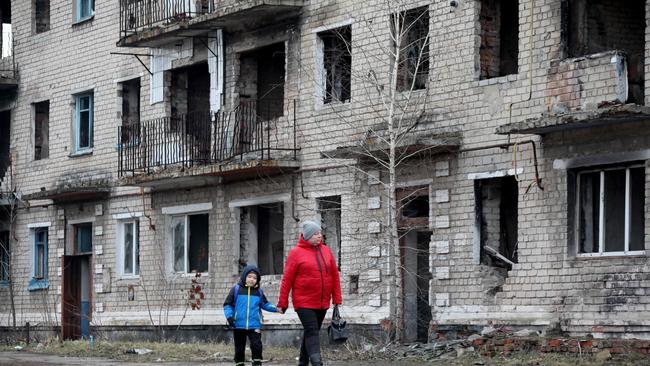
The UK will also look to sanction members of the Russian Duma and Federation Council who voted to recognise the independence of Donetsk and Luhansk. Mr Johnson has also called for the Champions League final, scheduled for St Petersburg in May, to be relocated outside of Russia.
The EU followed Britain’s move, introducing similar sanctions, while the G7 foreign ministers agreed to condemn Russia’s recognition of the two breakaway regions as it violated Ukraine sovereignty and territorial integrity, as well as international law.
Military analysts have pointed out that the feared Russian National Guard, called Rosvgardia, is moving towards the Belarus-Ukraine border to target Kyiv.
Meanwhile, Germany was ready to send more troops, including some to Lithuania, defence minister Christine Lambrecht said.



